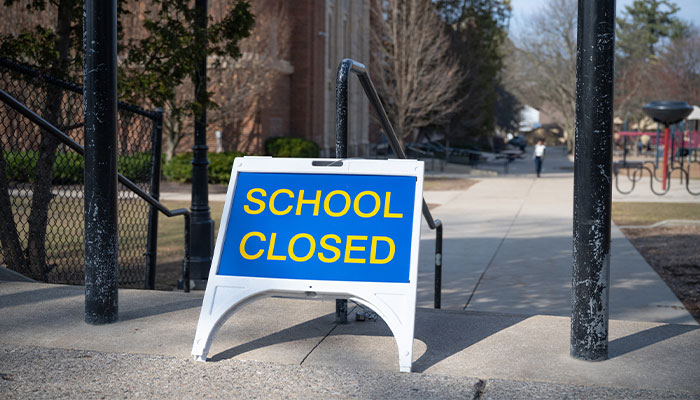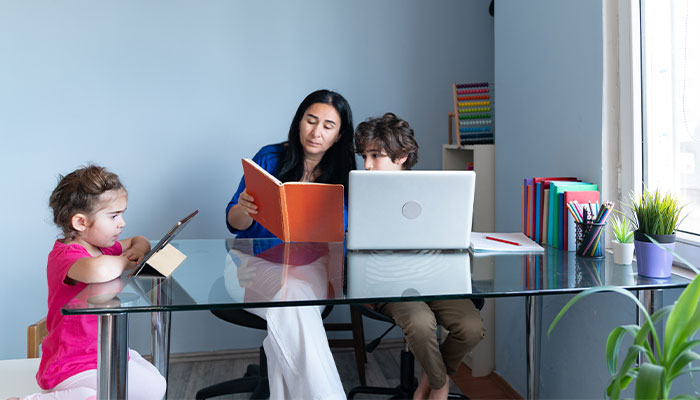After nearly three months of lockdown in response to the latest COVID-19 outbreak in NSW, there's growing concern about the long-term educational impact on the state's 1.2 million school children, most of whom will learn from home for around half of the school year.

Reassurance: NAPLAN results were not significantly different than those from 2019, despite school closures.
It's a global phenomenon; UNESCO reports that COVID-19 school closures up to November 2020 saw the average child worldwide losing 54 per cent of annual contact time with their teachers, sparking concerns for the impact on global literacy and numeracy.
"Parents can be reassured that we've seen no discernible impact from the current situation, on numeracy and literacy as measured by the standardised NAPLAN tests," says Professor Garry Falloon, who is Professor of STEM Education at Macquarie University.
Students' NAPLAN results in 2021 released last month were not significantly different from those in 2019, and even improved in some areas, such as Years 3 and 5 reading and Year 7 writing, despite schools in NSW in 2020 closing for seven weeks, and schools in Victoria for more than 20. NAPLAN testing was abandoned in 2020 due to COVID-19.
Learning isn't just about ticking the boxes of a syllabus or a curriculum; it is a social process, we learn with each other and from each other.
However, Falloon says that standardised test scores don't tell the whole story.
"While children don't seem to be showing a big loss of learning, there has been a loss of schooling and all the other things that the experience of schooling brings," says Falloon.
"But we need to remember learning isn't just about ticking the boxes of a syllabus or a curriculum; it is a social process, we learn with each other and from each other, we learn through experiences, which can help us build robust capabilities," he says.
"At school, these capabilities might be more general, like teamwork and communication; but countering that the experience of learning at home could provide opportunities to improve other capabilities such as children's independence and perseverance."
Parents as learning supervisors, not teachers
Many parents have had to juggle work from home at the same time that their children are trying to do school-work – a challenging situation, Falloon says.

New lessons: Falloon says that the parents' role is as a supervisor of learning, and they should resist 'doing the work' for their kids.
"Parents are not expected to be teachers, and learning from home is not home-schooling," he says.
"We are in an unprecedented situation, very different to families who choose to sign up for home-schooling where a 'parent as teacher' relationship is a recognised instructional approach; nobody has signed up to our current scenario by choice."
Falloon says that the parents' role is as a supervisor of learning, with the bulk of formal instructional materials and teaching interactions provided by their child's school.
We are writing the rulebook for learning during lockdown as we go – but a few 'rules of thumb' are emerging.
But, he says, parents can use lockdown as an opportunity to introduce informal learning experiences, perhaps drawing on the NSW Department of Education lockdown learning resources, or following ideas introduced by creative and innovative classroom teachers.
He cites an exercise by one school where children's spelling list included items to identify from a neighbourhood walk, with parents helping by sending photos of located items for verification by the 'co-ordinating' student.
Formal learning is usually for only a few hours each day
"Even when children are in school, they don't engage in formal learning continuously across the day – the average class will probably have around three hours of 'learning time' each day," Falloon says.


Mix it up: Professor Garry Falloon (pictured) says the learning day should be viewed as a series of 'learning bursts' rather than lengthy subject blocks.
The NSW Department of Education provides approximate 'learning from home' guidelines for 'core' subject learning in K-6 Maths and English of around 45 minutes each daily, plus around 60 minutes for other subjects (which are often integrated into themes or topics in primary schools).
"This learning time doesn't need to be in single blocks, and generally, the younger the child the shorter the concentration span," he says.
Falloon points out that the learning from home day should be viewed as a series of 'learning bursts' rather than lengthy subject blocks, with formal learning punctuated with informal learning opportunities and regular breaks.
"If you go into a school classroom, kids don't sit down for four to five hours a day; they shift from one exercise at their desk for ten minutes then stand up and move to a group to work together, the teacher will talk to them or show them something on a board, then they might sit down again for another ten or fifteen minutes to do a task," he says.
Eight tips to help parents with learning in lockdown
"We are writing the rulebook for learning during lockdown as we go – but a few 'rules of thumb' are emerging," says Falloon.
- Establish a workable daily routine and stick to it: "Routines are important for children of all ages, from when you get up to when you start work and take breaks," he says. "Mornings are often best for formal learning."
- Set up a quiet, dedicated learning space for schoolwork and remove distractions: "Some parents set up workspaces with timetables and learning materials the night before, and disable device notifications for children who are working online."
- Set clear expectations, defined by outputs rather than time spent: "Checking 'screen time' is important for health and wellbeing, but we all know time spent at a screen does not necessarily equate to level or quality of output."
- Resist 'doing the work' for your kids: "Use open-ended questions to encourage your children to work out their own answers to learning challenges or problems - What? How? Why? Can you explain? Tell me how you… ?"
- Reward goals: "Agree on some output-focused targets for your children, with breaks, fun activities and exercise as motivations to meet these."
- Be present when you're present. "When you promise your child some quality time, turn off your emails and messages. Make sure time spent with them is quality time"
- Team up: "Some parents have developed rosters where one parent supervises the children of others online, making it possible for other parents to focus on work."
- Maintain social interactions between friends and classmates: "Try to encourage children to collaborate virtually in groups on learning tasks using online collaborative tools like Google apps (even if it's not done at the same time). Doing this serve both academic and social purposes."
Professor Garry Falloon is Director of International Engagement and Professor of STEM Education, Macquarie School of Education






